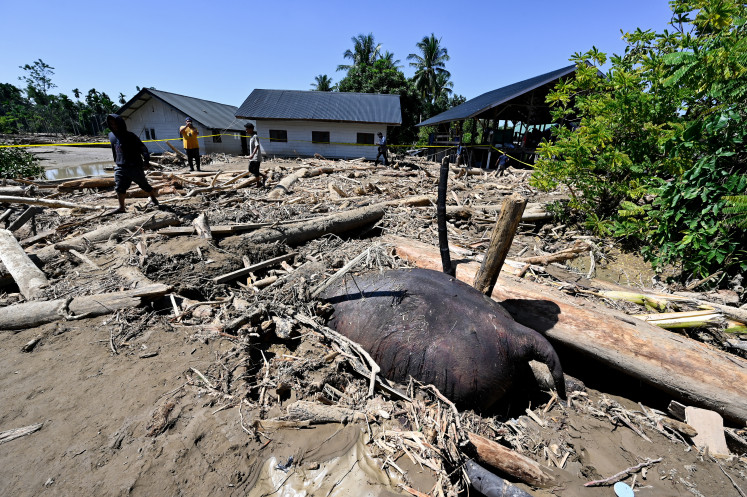Popular Reads
Top Results
Can't find what you're looking for?
View all search resultsPopular Reads
Top Results
Can't find what you're looking for?
View all search resultsDurian import moratorium does not smell sweet to Thai farmers
Senior officials at the Trade and Agriculture Ministries will meet to discuss protests raised by the government’s recent decision to suspend imports of certain fruit and vegetables, Trade Minister Gita Wirjawan says
Change text size
Gift Premium Articles
to Anyone
S
enior officials at the Trade and Agriculture Ministries will meet to discuss protests raised by the government’s recent decision to suspend imports of certain fruit and vegetables, Trade Minister Gita Wirjawan says.
Officials will address the issue in partnership with a Thai counterparts following protests from Thai durian exporter who claims to be suffering significant losses through Indonesia’s export ban.
“We will discuss this issue soon with both the Agriculture Ministry and the Thai authorities,” he told The Jakarta Post.
Gita has hinted that Indonesia may allow renewed imports of fruit and vegetables as long as they met health and safety requirements.
At the end of last month, the Agriculture Ministry announced that it would not authorize importation of 13 kinds of vegetable and fruit products including potato, carrot, chili, banana, papaya and durian until the end of June.
This protectionist measure was taken specifically because Indonesia harvests produce on the list in the first half of the year.
The ministries hope that the new arrangements will help domestic farmers to sell at reasonable prices, according to Deputy Agriculture Minister Rusman Heriawan.
Based on 2012 Agricultural ministerial regulations on imports, the Ministry has the authority to decide on the importation of fruits and vegetable in any six-month period.
The decision should be based on various considerations, such as the availability of supplies in the domestic market.
The Trade Ministry issues import permits on the recommendation of the Agricultural Ministry.
Recently, the United States lodged a complaint with the World Trade Organization over Indonesia’s importation controls and regulations for fruit and vegetables, stating that Indonesia had created a “complex web of import licensing requirements” that unfairly restricted trade.
Thai fruit exporters last week raised their concerns over the halt of durian imports. Durian exports to Indonesia total around 600 million baht (US$20 million) per year, and Thai Agriculture Minister Yukol Limleamthong said he will negotiate with Indonesia to have the ban lifted.
At home, local stakeholders fully support the government’s move to manage local supply through a temporary suspension of imports and expect the ban to continue.
Karen Tambayong, chair of the agriculture market development committee at the Indonesian Chamber of Commerce and Industry, declared the temporary measure during the harvest period would be an opportunity for the local market to absorb as much as domestically produced fruit and vegetables as possible.
“This is a good opportunity for local producers. At the same time, it is a wake-up call for us to considerably boost both the quantity and quality of our local output in the future,” she said.
Benny Kusbini, chair of the National Horticulture Council, expressed concerns that a lot more effort would be required to address some very basic problems which currently afflict the horticulture supply chain.
“In the long term, we need to encourage the producing regions to produce more and to raise the standard of their products,” he said, adding that packaging and distribution were also big challenges for domestic supply.
At present, local fruit and vegetable production is usually carried out by small scale local growers. This poses challenges over the continuity of supply often voiced by retailers.
Poor infrastructure is a major impediment to the transportation of harvests from producers to the markets.
Often, produce does not reach consumers in the best possible condition due to poor post-harvest management.










